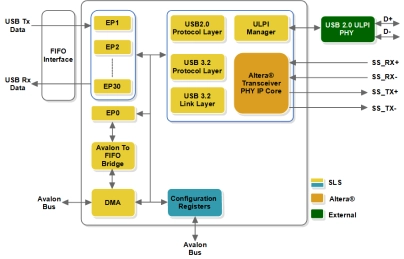USB 2.0 device controller with ULPI interface IP
Filter
Compare
20
IP
from
15
vendors
(1
-
10)
-
USB 2.0 Device Controller with ULPI interface
- Full compliance with the USB 2.0 specification
- Full-speed 12 Mbps operation
- High-speed 480 Mbps operation
-
USB 2.0 Device Controller version 4 with Active Clock Gating to save active power
- Configuration options to maximize performance and minimize CPU interrupts
- Flexible parameters enable easy integration into low and high-latency systems
- Transfer- or transaction-based processing of USB data based on system requirements
- Configurable data buffering options to fine-tune performance/ area trade-offs
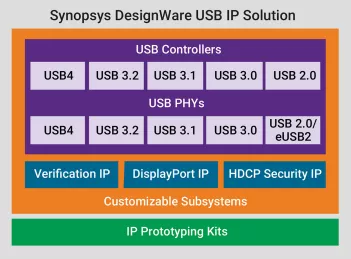
-
USB 2.0 Hi-Speed OTG Controller Subsystem w/AHB Interface Supporting HSIC (config. as Device only or Full Speed only)
- Configuration options to maximize performance and minimize CPU interrupts
- Flexible parameters enable easy integration into low and high-latency systems
- Transfer- or transaction-based processing of USB data based on system requirements
- Configurable data buffering options to fine-tune performance/ area trade-offs
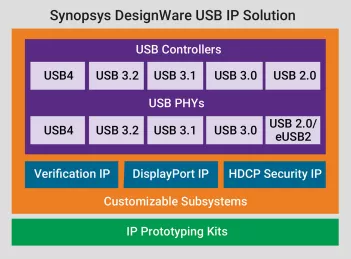
-
USB 2.0 Device Controller IP
- The USB 2.0 device controller can be configured to support all types of USB transfers – bulk, interrupt and isochronous. While operating in device mode, it can be dynamically configured to support a configurable number of endpoints, interfaces, alternate interfaces, and settings.
- The USB 2.0 device controller can be configured to support any combination of USB 2.0 interface speeds – LS (1.5 Mbps), FS (12.0 Mbps), HS (480 Mbps). Sample combinations are LS only, FS only, HS only, LS and FS, and FS and HS.
- The USB 2.0 device controller supports all low-power features of USB specifications, including suspend, remote wakeup and Link Power Management states – L1, L2.
- The USB 2.0 device controller supports all test modes features, a requisite for obtaining USB-IF certification
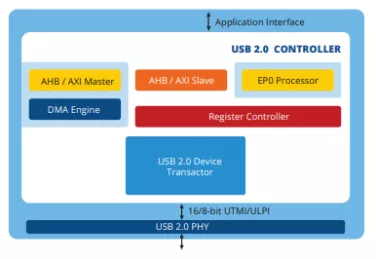
-
USB 2.0 Device Controller
- The Universal Serial Bus Device controller (GRUSBDC) provides an interface between an USB 2.0 bus and an AMBA-AHB bus.
- The core is used for implementing USB 2.0 functions providing access to the USB device through either an AHB slave or an AHB master interface.
-
AXI USB 2.0 Device Controller
- AXI-4 based host Interface. AXI-4 Lite for Slave Interface and optional AXI-4 Master interface for DMA mode
- Supports High Speed and Full Speed USB 2.0 specification
- Supports high speed, high bandwidth isochronous transactions
- Supports up to eight endpoints, including one control endpoint 0. Endpoints 1 to 7 can be bulk, interrupt, or isochronous and are individually configurable
-
USB 2.0 Device, Software Enumeration FIFO Interface (USB20SF)
- The USB 2.0 Device, Software Enumeration FIFO interface (USB20SF) IP Core is a FIFO based USB 2.0 device core with 32-bit Avalon/AXI/AHB Lite interface and ULPI interface support.
- Avalon/AXI/AHB Lite interface allows to manage the control transfer using software, provides flexibility, while FIFO interface allows to transfer the data over non-control endpoint ensuring highest throughput.
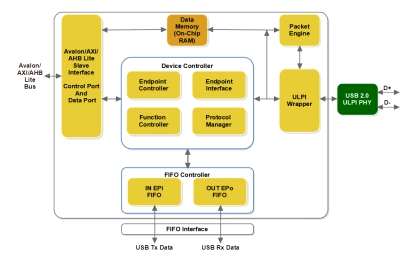
-
USB 2.0 Hi-Speed OTG Controller version 4 with Active Clock Gating to save active power
- Configuration options to maximize performance and minimize CPU interrupts
- Flexible parameters enable easy integration into low and high-latency systems
- Transfer- or transaction-based processing of USB data based on system requirements
- Configurable data buffering options to fine-tune performance/ area trade-offs
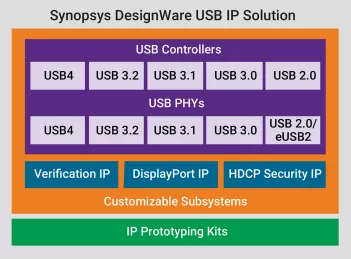
-
AXI 2.0 USB Device IP
- AXI4-Lite standard user interface. Connects as a 32-bit slave on AXI interface
- USB serial interface engine implemented to support USB2.0 full speed and high speed interface
- Supports ULPI interface to external PHY chip
- Supports control, bulk, interrupt and isochronous transfers on USB interface
-
USB 20Gbps Device Controller
- Leveraging the benefits of USB 10Gbps and 5Gbps device controller, USB 20Gbps is designed using the FPGA built-in transceiver.
- It is a one-stop solution for all USB requirements ranging from USB 3.2 to USB 2.0.
- It supports SuperSpeed+ (SSP x2/x1), SuperSpeed (SS), High Speed (HS) and Full Speed (FS) communication modes.
